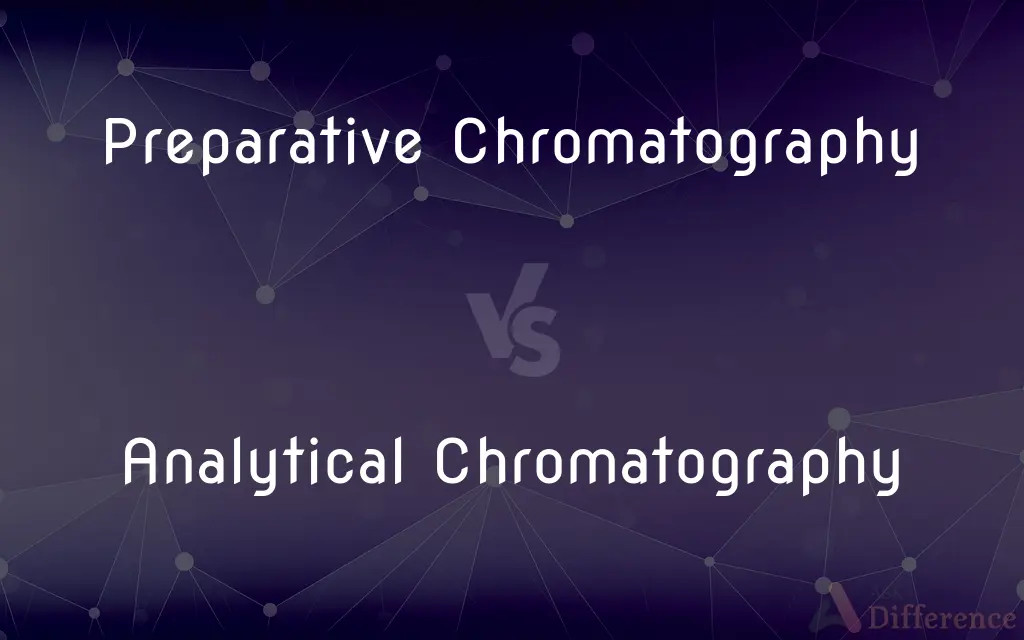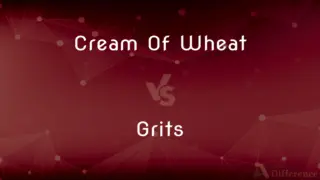Preparative Chromatography vs. Analytical Chromatography — What's the Difference?
Edited by Tayyaba Rehman — By Fiza Rafique — Published on December 5, 2023
Preparative Chromatography separates compounds for collection and use, while Analytical Chromatography analyzes the composition of a mixture without collecting its components.

Difference Between Preparative Chromatography and Analytical Chromatography
Table of Contents
ADVERTISEMENT
Key Differences
In the realm of chromatography, both Preparative Chromatography and Analytical Chromatography play pivotal roles, albeit with different objectives. Preparative Chromatography is primarily concerned with separating compounds in quantities sufficient for further use or study. It often results in the purification of a particular compound from a mixture, enabling researchers or industries to collect and utilize that purified component for various applications, be it drug development or chemical synthesis.
Conversely, Analytical Chromatography is employed when the primary goal is to identify and quantify the components of a mixture. It doesn't typically focus on collecting the separated compounds but instead aims to provide a detailed analysis of the mixture's composition. Through Analytical Chromatography, scientists can determine the presence, concentration, and interactions of compounds within a sample, making it a cornerstone technique in quality control, diagnostics, and research.
A tangible difference between Preparative Chromatography and Analytical Chromatography lies in the scale. Preparative methods often operate at a larger scale to procure adequate amounts of a target compound. On the other hand, Analytical Chromatography is concerned less with quantity and more with providing a precise and detailed analysis, often working with smaller sample sizes.
Instrumentation and techniques can sometimes overlap between Preparative Chromatography and Analytical Chromatography, but the tools are optimized according to their distinct objectives. Preparative techniques might prioritize efficient separation and collection mechanisms, while analytical tools emphasize sensitivity, resolution, and accuracy.
Comparison Chart
Primary Objective
Separation for collection and use.
Identification and quantification of mixture components.
ADVERTISEMENT
Scale
Typically larger to obtain sufficient amounts.
Generally smaller, focused on detailed analysis.
Collection of Separated Compounds
Yes, compounds are collected for further use.
No, primary focus is on analysis, not collection.
Instrumentation Concerns
Efficient separation and collection mechanisms.
Sensitivity, resolution, and accuracy.
Typical Applications
Purification for drug development, chemical synthesis.
Quality control, diagnostics, research.
Compare with Definitions
Preparative Chromatography
This method is instrumental in refining specific components for further use.
Preparative Chromatography purified the enzyme used in a crucial biochemical reaction.
Analytical Chromatography
It operates on a smaller scale, emphasizing accuracy and resolution.
A trace amount of a contaminant was detected using Analytical Chromatography.
Preparative Chromatography
It operates on a larger scale to obtain adequate compound amounts.
The isolation of a natural compound for study often requires Preparative Chromatography.
Analytical Chromatography
It provides detailed insights into a sample's composition without collection.
Analytical Chromatography revealed the presence of a rare metabolite in the blood sample.
Preparative Chromatography
Preparative Chromatography focuses on separating and collecting compounds from mixtures.
Pharmaceutical companies use Preparative Chromatography to purify potential drug candidates.
Analytical Chromatography
This method is vital for quality control and diagnostics.
Pharmaceutical firms utilize Analytical Chromatography to ensure consistent drug composition.
Preparative Chromatography
It is crucial in industries where pure substances are essential.
To obtain a specific fragrance compound, Preparative Chromatography was employed.
Analytical Chromatography
Analytical Chromatography often employs advanced detectors for precise analysis.
With Analytical Chromatography and UV detection, the team quantified the dye concentrations.
Preparative Chromatography
Preparative Chromatography can be iterative, refining a compound to higher purities.
The chemist used successive rounds of Preparative Chromatography to achieve 99% purity.
Analytical Chromatography
Analytical Chromatography identifies and quantifies mixture components.
In the lab, Analytical Chromatography determined the concentration of each acid in the sample.
Common Curiosities
How does Analytical Chromatography differ in its approach?
Analytical Chromatography focuses on identifying and quantifying the components of a mixture without necessarily collecting them.
Why might a researcher choose Preparative Chromatography?
If a researcher needs to isolate a compound in sufficient quantities for study or application, they'd opt for Preparative Chromatography.
What factors can influence the choice between Preparative and Analytical Chromatography?
The intended purpose (collection vs. analysis), required scale, and desired precision can influence the choice.
What's the main goal of Preparative Chromatography?
Preparative Chromatography aims to separate and collect specific compounds from mixtures for further use.
Can the same instrument be used for both Preparative and Analytical Chromatography?
While some instruments can be adapted for both, they are typically optimized for one purpose over the other.
In what scenarios is Analytical Chromatography crucial?
Analytical Chromatography is vital in quality control, diagnostics, and when detailed analysis of mixture composition is needed.
Are there overlaps in techniques between the two chromatography types?
Yes, both might use similar chromatographic techniques, but they will be optimized differently.
Does Preparative Chromatography always yield pure compounds?
While it aims for purity, further rounds or methods might be needed to achieve the desired purity level.
Can a single chromatographic run serve both preparative and analytical purposes?
While uncommon, it's possible if the run provides both sufficient separation for collection and detailed analysis data.
How does scale factor into Preparative Chromatography?
Preparative Chromatography typically operates at a larger scale to yield sufficient quantities of a target compound.
Is high resolution always a concern in Analytical Chromatography?
Yes, high resolution is often essential in Analytical Chromatography to differentiate closely related compounds.
Why might a company invest in both chromatography types?
A company might need Preparative Chromatography for product development and Analytical Chromatography for quality control.
Which chromatography type is more resource-intensive?
Preparative Chromatography can be more resource-intensive due to the larger scale and collection mechanisms.
Are there safety concerns unique to Preparative Chromatography?
As with any lab technique, safety concerns exist. With Preparative Chromatography, there might be risks related to handling larger quantities of compounds.
Can Analytical Chromatography detect compounds not separated by Preparative Chromatography?
Yes, Analytical Chromatography, with its focus on detailed analysis, might detect compounds overlooked in preparative methods.
Share Your Discovery

Previous Comparison
Cream Of Wheat vs. Grits
Next Comparison
5’10 vs. 5’8Author Spotlight
Written by
Fiza RafiqueFiza Rafique is a skilled content writer at AskDifference.com, where she meticulously refines and enhances written pieces. Drawing from her vast editorial expertise, Fiza ensures clarity, accuracy, and precision in every article. Passionate about language, she continually seeks to elevate the quality of content for readers worldwide.
Edited by
Tayyaba RehmanTayyaba Rehman is a distinguished writer, currently serving as a primary contributor to askdifference.com. As a researcher in semantics and etymology, Tayyaba's passion for the complexity of languages and their distinctions has found a perfect home on the platform. Tayyaba delves into the intricacies of language, distinguishing between commonly confused words and phrases, thereby providing clarity for readers worldwide.












































